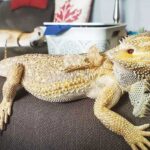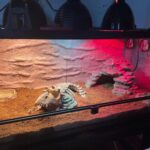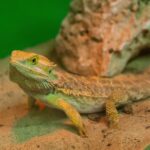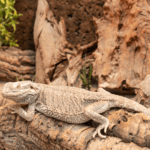Do you have a pet bearded dragon, or are you considering getting one? If so, you might be wondering about the common bearded dragon lifespan. After all, you’re looking for a companion you can spend many years with!
While we can’t guarantee your bearded dragon will make it to the ripe old age of 14 years (the upper end of lifespans for a bearded dragon in captivity), there are some things that you can do to help them live as long and healthy of a life as possible.
In this blog post, we’ll discuss what factors influence their lifespan, how to tell how old they are, and tips on keeping your pet happy and healthy so they can live their best lives!
The average lifespan of a bearded dragon in captivity is 5-14 years. Most pet bearded dragons will make it to the upper age range, but this is not guaranteed; there are a number of factors that can impact how long a bearded dragon lives.
Generally speaking, bearded dragons in captivity outlive their counterparts in the wild. This is because the domestic life offers them access to food, water, and a stable environment. Since they don’t have to worry about predators or other environmental dangers like in the wild, they can focus their energy on enjoying life with less stress.
Bearded dragons living in the wild typically have a shorter lifespan (it’s a tough life out there for a little lizard).
The average is 5-8 years because of predators, food and water shortages, extreme weather, and other environmental hazards they face.
In their natural habitat of the semi-arid Australian outback, these creatures must have the skills and ability to survive in an often harsh environment. Birds of prey, snakes, dingos, and feral cats all prey on bearded dragons. Extreme heat, drought, and floods also pose a great threat to these animals.
It’s not unheard of for a wild bearded dragon to live upwards of 10 years, but this requires a lot of luck and an ideal environment.

The average lifespan of a bearded dragon in captivity is about 10 years. However, some dragons can live much longer if they are well taken care of and given the right environment — up to 14 years.
Factors like poor genetics, preventable disease, and improper care can shorten a bearded dragon’s lifespan. Conversely, proper diet, a stable environment, and diligent care can make help a bearded dragon live longer in captivity.
It’s fairly standard for bearded dragons to live up to 14 years in captivity, but the oldest bearded dragon ever was 18 years and 237 days old. “Sebastian,” the record holder for longest lifespan for a bearded dragon was raised in captivity in the United Kingdom and died on January 24th, 2016.
Like any living creature, the lifespan of a bearded dragon is greatly influenced by the environment it’s in. Here are some key factors that can contribute to your pet’s longevity:
The size, temperature, humidity, and setup of the tank plays a key role in the health and happiness of your bearded dragon. Perfecting environmental conditions helps reduce stress and decreases the likelihood of lifespan-shortening diseases.
Temperature is one of the most important factors that can impact a bearded dragon’s lifespan. Ideally, the hot side of the tank should reach about 95-105 degrees Fahrenheit, and the cool side should be between 75-85 degrees. This temperature gradient allows your pet to regulate its body temperature, which is essential for their health.
Humidity levels should also be monitored and kept between 30-40%. Too much or too little humidity can cause respiratory infections and other health issues that can shorten a bearded dragon’s lifespan.
UVB lights are also essential for bearded dragons. These lights facilitate the production of Vitamin D3, which is important for their health and keeping the immune system strong. Insufficient UVB exposure can lead to metabolic bone disease, which can significantly shorten a bearded dragon’s lifespan.
The size of the tank is also important. Generally speaking, bigger is better: a 120 gallon tank is considered the acceptable tank size for a single adult bearded dragon. An enclosure that’s too small can cause stress and lead to health problems.
A safe substrate (such as reptile carpet or ceramic tile) should be used in the tank, as sand and other loose substrates can cause impaction — a potentially fatal condition caused when a bearded dragon accidentally ingests particulate matter.
A balanced diet plays a huge role in bearded dragon health. A combination of live insects, fresh fruits and vegetables, and supplements is essential for good health. It’s also important to feed your dragon a variety of different foods and adjust quantities based on age, size, and activity level.
Adults require a more plant-heavy diet that focuses on leafy greens, while hatchlings and juvenile dragons should be fed more insects.
Beardies of all ages require nutrient-dense food choices, like dark, leafy greens and gut-loaded insects. A diet with too much nutrient-poor food (such as iceberg lettuce and fatty insects like grubs) can cause nutritional deficiencies.
Calcium supplements should also be given regularly to ensure proper bone growth and prevent metabolic bone disease. Supplements are available in powder form and can be dusted over your pet’s food for easy consumption.
It’s well known that egg laying places a female bearded dragon’s body under a tremendous amount of stress. This can lead to calcium deficiency and other serious health problems that can severely impact their lifespan.
All female bearded dragons lay eggs at some point in their adult lives, but those cohabitating or placed in close proximity to males will lay more often. Therefore, it is important to keep female bearded dragons separated from males as much as possible in order to prolong their lifespans.
Bearded dragons can be prone to a variety of illnesses, such as respiratory infections and parasitic infestations. These ailments can easily shorten their lifespan if left untreated.
Additionally, they subject the animal to a great deal of discomfort and stress, which can further negatively impact bearded dragon lifespan.
The breed and lineage of a bearded dragon will also affect its lifespan. Some breeds are more prone to health problems, while others may live longer due to better genetics.
Bearded dragons that have been selectively bred from healthy specimens by a professional breeder will tend to live longer than those from less careful pet stores.
In general, larger bearded dragons tend to live longer and have fewer health problems than smaller ones, as they are more resilient to environmental changes and accidents. Larger bodies just handle stress better than smaller ones. This is a rule that applies to most reptiles.
Bearded dragons can live anywhere from 5-14 years depending on their care and living conditions, so there are a few things you can do to ensure your pet lives a long, healthy life.
A balanced diet with plenty of fresh vegetables and fruits, as well as live insects, can help a bearded dragon stay healthy. Calcium supplements should be given regularly to ensure proper bone growth and prevent metabolic bone disease.
Providing a comfortable and safe environment is essential to ensuring your pet’s health. The cage should be spacious enough for the bearded dragon to move around and bask, and the temperature should be regulated.
Maintain a tank with a temperature gradient (95-105 degrees Fahrenheit on the hot side and 80 degrees Fahrenheit on the cool side) so the dragon can choose its own preferred temperature. Ensure a relative humidity of 30-40%, and provide suitable UVB exposure to promote a long bearded dragon lifespan.
Additionally, keep the cage clean and free of any potential toxins or dangerous objects. Look out for anything small enough to be swallowed. Impaction can occur if your bearded dragon were to swallow something it can’t digest.
Finally, make sure to take your bearded dragon in for regular vet checkups. Your vet can help diagnose any potential health problems early so they can be treated promptly. This way, you can ensure your pet’s long and healthy beard dragon lifespan.
Evidently, there are a number of factors that contribute to a bearded dragon’s lifespan. With proper care and regular vet checkups, bearded dragons can enjoy a long and healthy life. Make sure to provide your pet with the best nutrition, environment, and veterinary care possible for a long and happy life.

Egg laying is a significant part of a female bearded dragon’s lifespan and health. Breeding should be done responsibly with the animal’s welfare in mind. Overbreeding can lead to calcium deficiencies and other health problems.
Every female bearded dragon is likely to produce a clutch of eggs at some point in her mature life. However, females that are cohabitated or kept near males produce eggs more often than those kept solitary or with other females. Avoiding contact with males can reduce the amount of time a female bearded dragon lays eggs, thus promoting a longer lifespan.
Determining the age of a bearded dragon can be difficult. The best way to tell how old a bearded dragon is to ask your breeder or vet directly. Establishing your pet’s age early in their life can help you can track of their progress and provide the best care possible as they age.
If you are unable to get this information from a breeder or vet, you may be able to make some guesses based on your bearded dragon’s size (if your beardie is not yet full grown).
At hatching, a bearded dragon measures about 4” long. From there, most will grow an additional 1-2 inches in length each month. At one year old, they should measure around reach their full size of 18-24″.
Use the growth chart here to determine how long your bearded dragon is based on their size:

Measuring the size of your bearded dragon can give you an estimate of their age, but this is not always reliable. Some bearded dragons may grow faster or slower than others due to diet and genetics.
The best way to determine your beard dragon’s age without consulting a vet is to measure their size. At hatching, bearded dragons are about 4” long and grow 1-2 inches in length each month until they reach their full size of 18-24″.
The environmental factors that can impact the lifespan of bearded dragons include temperature, humidity, UVB exposure, and tank size and cleanliness. A comfortable and safe environment with a temperature gradient, relative humidity of 30-40%, and appropriate UVB exposure can help ensure your bearded dragon has a long life.
In general, male bearded dragons tend to live longer than females. This is because males are usually larger than females and thus more resilient to disease and illness. Additionally, some female bearded dragons experience lifespan reduction due to being overbred.

There is no “magic bullet” that can wildly expand a bearded dragon’s lifespan, but regular vet checkups can help catch any health issues before they become severe. The standard treatments a vet prescribes for any health issues can mitigate the damage and stress of common diseases and help your bearded dragon live longer.
So, there you have it! Bearded dragons can live for a long time with proper care and nutrition.
Here are the five most important points to remember:
- Wild bearded dragons typically live around 8-10 years.
- Captive bearded dragons may live up to 14 years with good care.
- Factors such as diet, environment, breeding practices, and veterinary care can extend or reduce your pet’s lifespan.
- You can determine your beard dragon’s age by measuring their size at hatching and tracking their growth over time.
- Regular vet checkups can help catch any health issues before they become severe and increase your pet’s lifespan.
So if you own a bearded dragon or are thinking of getting one, make sure to provide them with all the love and attention they deserve so that they can enjoy a long life full of fun adventures!
With proper care and nutrition, you can guarantee years of memories with your scaly friend!

![How Long Do Bearded Dragons Live? [Lifespan & Age Explained]](https://www.thecritterdepot.com/cdn/shop/articles/bearded_dragon_bath_8452b205-fe5c-463f-90e8-13a975bcef66_640x640@2x.jpg?v=1553216107)




:max_bytes(150000):strip_icc()/13-f9fc54bc64854d20b43e00db91a9cb16.jpg)